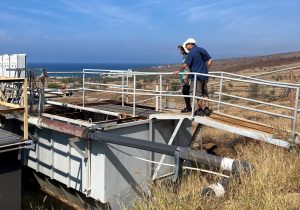Where: Kawaihae, Hawaiʻi County, Hawaii
Problem: Rural communities face challenges accessing funds for utility improvements that ensure public health.
Solution: RCAC staff helped a small all-volunteer sewage treatment association access USDA funding.

Kawaihae Village is a small hillside community in Kawaihae, an unincorporated town on the west side of Hawaii’s Big Island. The village is a planned unit development built in the early 1970s for workers at the nearby Mauna Kea Beach Hotel. Kawaihae Village comprises 25 single-family homes, 26 duplexes and 16 apartments. Residents range from first-generation homeowners, including some still employed in the hospitality industry, to residents from the mainland who live in the village part-time. While income levels vary, the median household income (MHI) of $42,600 is well below the national average.
Kawaihae Village’s wastewater treatment plant was built in 1972 and contains an underground injection control well and a backup well at a depth of approximately 55 feet. Whenever the system experienced problems, the all-volunteer Kawaihae Village Sewage Treatment Association (KVSTA) made basic repairs to meet Hawaii Department of Health (DOH) requirements. The situation reached a breaking point in 2018 when the DOH Wastewater Branch notified the association that their underground injection well violated new federal regulations.
Following a thorough search for outside funding to revamp its solid waste infrastructure, KVSTA approached U.S. Department of Agriculture-Rural Development (USDA-RD). However, the association lacked the basic capacity to access grant funding. RD recommended that the village reach out to Rural Community Assistance Corporation (RCAC) for technical assistance. RCAC soon began a years-long project involving several Technical Assistance Providers (TAPs). The Rural Community Assistance Partnership (RCAP) Technitrain project funded by USDA’s Rural Utilities Service (RUS) made this work possible.
RCAC helped the homeowners’ associations complete the MHI survey, Preliminary Engineering Report (PER) and Environmental Report (ER) required to access RD funds. The cash-strapped community required a Special Evaluation Assistance for Rural Communities and Households (SEARCH) grant to complete these essential predevelopment feasibility studies. After a long waiting period complicated by the COVID-19 pandemic, the community received a $30,000 planning grant. The TAPs then worked with the community to prepare the Request for Proposals for the PER/ER. Only two local engineering firms ultimately submitted bids, and RCAC had to largely rewrite them to meet USDA requirements. Meanwhile, RCAC gathered financials from KVSTA’s contract bookkeeper and helped negotiate an extension to the contract with its licensed operator.
In spring 2022, USDA-RD awarded the village $818,000, its highest-level grant. A low-interest, 1.25-percent 40-year term loan of $241,000 accompanied the grant. RD also credited the village for the $30,000 spent during the pre-planning process. RCAC staff continues to assist the village and enhance its capacity. A true redundant wastewater system and modern leach field will soon be constructed to dispose of sewage sludge in an environmentally safe manner for generations to come.
“RCAC is not a luxury for communities such as ours – it is vital,” wrote former KVSTA President Kesaia Hayward. “It is impossible to thank RCAC enough for their help, or to state how important this organization is.”
